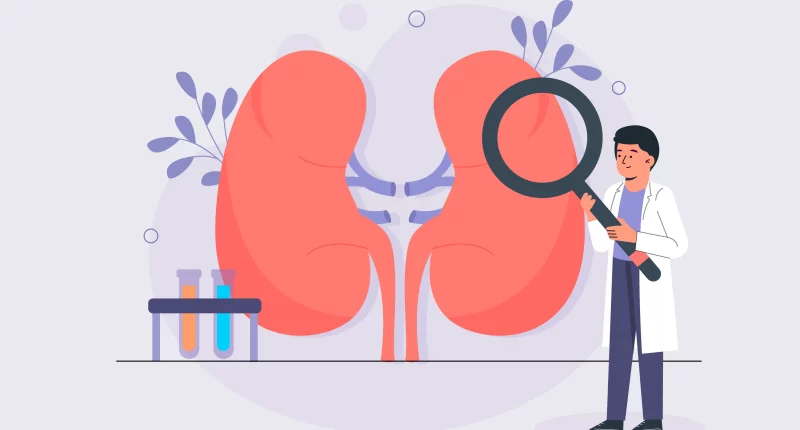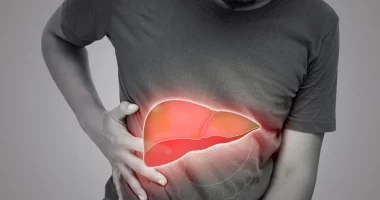Bartter syndrome is an uncommon genetic condition where the kidneys can’t hold onto salt, calcium, potassium, and other minerals properly, causing them to be lost in the urine. This leads to dehydration and low levels of these minerals in the body. Individuals with Bartter syndrome often feel tired, get muscle cramps, feel weak, and can develop brittle bones and kidney hardening (glomerulosclerosis).
Healthcare providers diagnose Bartter syndrome using urine tests blood tests, and sometimes a genetic test to confirm it. Treatment focuses on handling symptoms like dehydration and mineral imbalances. Unfortunately, there’s no cure for Bartter syndrome yet.
Types
Bartter syndrome presents in five important types, each linked to a particular gene mutation. Some types, like Type 1, Type 2, Type 4, and Type 5, typically show symptoms before birth also known as antenatal, while Type 3, known as “classic” Bartter syndrome, often manifests symptoms in childhood or later in life. The severity of symptoms varies depending on the mutation involved, with Type 4 and Type 5 generally causing more severe effects compared to Type 3.
These genetic mutations influence the type and severity of symptoms, including whether girls or boys are more susceptible. Understanding the specific gene mutation helps doctors predict the course of the disease and tailor treatment plans accordingly.
Symptoms
Bartter syndrome can show signs even before a baby is born, with too much amniotic fluid between 24 to 30 weeks of pregnancy.
Just-born babies with Bartter syndrome often pee a lot (polyuria), drink a lot (polydipsia), and may have diarrhea and vomiting. Although polyuria can be dangerous for newborns, some babies’ kidney function gets better in a few weeks without needing more treatment.
Key Symptoms of Bartter Syndrome:
- Loss of Salt: Dehydration, craving for salt, constipation, peeing a lot (polyuria), drinking a lot (polydipsia), and waking up in the middle of the night for urination (nocturia).
- Loss of Potassium: Low blood potassium (hypokalemia) causes muscle weakness, cramps, heart palpitations, tiredness, digestive problems, trouble breathing, and hearing loss.
- Loss of Calcium: Too much calcium in urine can stop bones from growing in children and lead to osteopenia—weak and brittle bones.
Causes
Bartter syndrome happens when a person inherits two abnormal genes—one from each parent—in what’s called an autosomal recessive pattern.
There are seven genes known to cause Bartter syndrome. Each gene is linked to a particular type of the condition. Different mutations in these genes can lead to varying symptoms and how severe the disease is.
These genes normally make proteins that help the kidneys reabsorb salt and minerals like calcium and potassium in the loop of Henle—a part of the kidney where salt and water are balanced in urine. When these genes are changed, these proteins can’t do their job properly, causing problems with how these compounds are handled in the body.
Diagnosis
To diagnose Bartter syndrome, doctors first review the signs and medical history of the patient. Because this condition is very rare, they often seek input from genetic counselors, geneticists, and other specialists.
Blood tests are crucial for diagnosing Bartter syndrome. These tests check for low levels of chloride, potassium, bicarbonate, and magnesium in the blood. They also look for higher-than-normal levels of hormones like aldosterone and renin.
Urinalysis, which examines urine, helps by detecting unusually high levels of chloride, sodium, potassium, magnesium, and calcium. It also looks for a substance called prostaglandin E2, which indicates kidney inflammation.
In some cases, Bartter syndrome can be diagnosed prior to birth if excessive amniotic fluid (polyhydramnios) is noticed, and there are higher levels of aldosterone and chloride in the amniotic fluid.
For a definite diagnosis, molecular genetic testing is used. Specialized genetic labs perform these tests to identify specific mutations associated with Bartter syndrome.
Treatment of Bartter Syndrome
The main goal in treating Bartter syndrome is to balance electrolytes and fluids in the body. The approach depends on how severe the symptoms are.
several children with mild symptoms may not need much treatment, as their fluid and electrolyte levels may become normal on their own. Others may require ongoing care from a team of doctors, including pediatricians, internists, or kidney specialists.
Medications
To correct electrolyte imbalances, doctors often prescribe supplements such as sodium, magnesium, and potassium chloride. These help restore normal levels of these minerals in the body. Inflammation and excessive urination can be treated with medications like nonsteroidal anti-inflammatory drugs such as ibuprofen or indomethacin. To prevent stomach issues from NSAIDs, medications like famotidine or cimetidine may be used.
Other medications Drugs like angiotensin II receptor blockers, aldosterone antagonists, and ACE inhibitors can also be necessary to lower renin levels and protect the kidneys.
Some people might need potassium-sparing diuretics like amiloride and spironolactone. These help remove sodium in urine while keeping potassium in the body.
Other Treatments
Severe cases may require a kidney transplant to correct serious problems, especially if kidney function is severely affected. For infants with life-threatening symptoms, intravenous fluids might be needed to replace water and salts.
Children who struggle to grow may benefit from growth hormone therapy to help with growth delays. Cochlear implants can help improve hearing for those affected by Bartter syndrome type 4.
Alongside treatments, children are often encouraged to eat foods rich in potassium and salt, under careful supervision. Ensuring they drink enough water is also crucial to maintaining good health.
Prognosis of Bartter Syndrome
Individuals with Bartter syndrome typically have a good outlook with proper management, often leading to normal lives.
Studies show that diagnosing and treating Bartter syndrome early can prevent long-term problems like stunted growth, too much calcium in the kidneys, and severe kidney disease.
A recent study tracked individuals with Bartter syndrome over several years. After treatment, 71% showed complete improvement in their metabolism and fully caught up in growth. Another 14% showed partial catch-up in growth.
Summary
Bartter syndrome is a rare genetic disorder affecting kidney function, causing excessive loss of salts and minerals in urine. Symptoms include dehydration, muscle weakness, and bone problems. Diagnosis involves blood tests, urinalysis, and genetic testing.
Treatment focuses on restoring electrolyte balance with supplements and medications. Prognosis is generally favorable with early detection and management, preventing long-term complications like kidney disease. Most individuals can lead normal lives with proper medical care and support.









